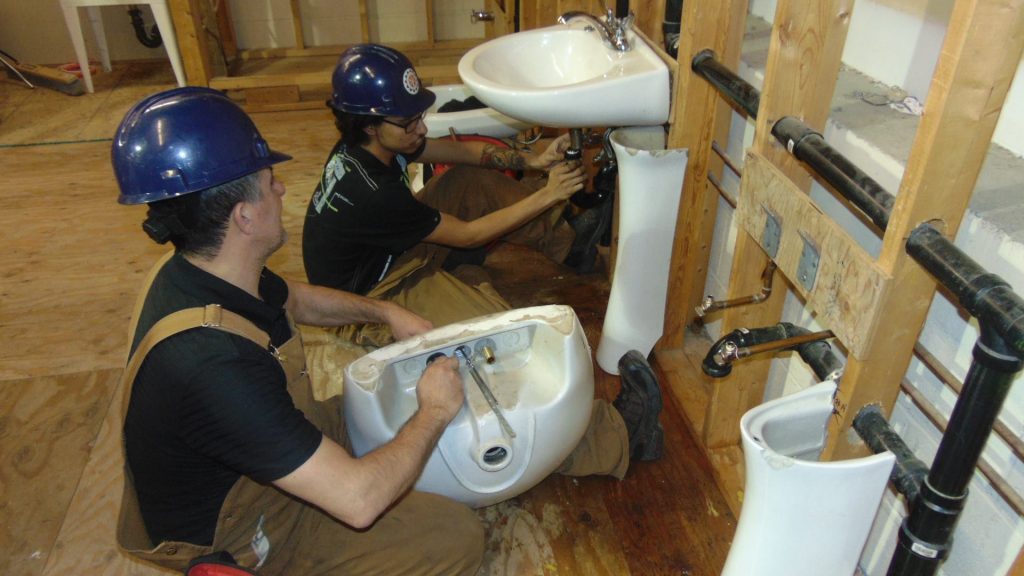Updated December 2025
Plumbers are respected, well-paid tradespeople. Everyone knows we rely heavily on skilled plumbers for basic survival needs (clean drinking water), and a wide range of daily conveniences (dishwashers, washing machines, toilets, showers, etc.)
This is one of the most popular trade careers out there. Thinking about becoming a plumber, and wondering what's involved in training, certification, and launching your career?
Here are your first five steps to get the ball rolling.
1. Understand your plumber career options
Plumbers do a lot more than unclog pipes and install faucets. If you become a plumber, you'll have several options for specialization. Obvious pathways include residential, commercial, and industrial work.
The kinds of tasks and challenges you'll tackle in each of these domains is different. For example, if you choose to work in an industrial setting, you'll be servicing large boilers, site sewer lines, lift stations, and industrial-grade pipes and fixtures.
If you focus on residential plumbing, you'll spend most of your time dealing with backed-up pipes, water heaters, home appliances, and other smaller-scale plumbing issues.
Also, residential work tends to be more personal, and includes more face-to-face time with clients. Commercial and industrial work doesn't have that same element of customer service.
Where else do plumbers work? Other career options include:
- Working for a property management company as an in-house plumber
- Starting your own plumbing business
- Working as a pipelayer, laying pipes for drainage, sewer, water, or gas systems underground
- Working as a pipefitter, installing low- and high-pressure pipes for commercial hydroelectric power plants, factories, or central air conditioning and heating
Where do you see yourself? The path you select may require specialized training, so it's important to map out your goals right from day one.
2. Look at the demand for plumbers in your area
It's always a good idea to check out the demand for the trade you're considering. This will give you a sense of how competitive the field is and how challenging it may be to find your first job.
For Ontario, the latest career outlook for plumbers is fairly stable. The Government of Canada Job Bank gives this trade three out of five stars for demand—which is considered moderate.
Bottom line: there are openings for plumbers out there, but you'll need to compete to get your foot in the door at a good company. Quality plumber training is key for getting that competitive edge.
Wondering how much money you'll make?
According to the Job Bank, the median wage for plumbers in Ontario is $32.50 per hour, or about $68,000 per year.
At the higher end, plumber salaries go up to $50.38 per hour, or about $105,000 per year.
Related: Why Plumber Training is Such a Smart Career Move
3. Review plumber training & Ontario certification requirements
So, once you've thought about plumber career paths, and looked at job outlook and salary, it's time to research training. Plumber is a regulated trade in Ontario, which means you need a Certificate of Qualification (C of Q) to legally work in the field.
In order to get your certificate, you must complete:
- 720 hours of in-school plumber training
- 8,280 hours of on-the-job work experience, as an apprentice
- a plumber certification exam
The whole process takes about five years. The good news is you'll get paid as a plumber apprentice, which means you'll be earning while you're learning.
4. Select a pre-apprenticeship plumber program
A good pre-apprenticeship plumber program will give you a valuable foundation in plumbing theory and hands-on skills. This training will give you an edge as you compete for apprenticeships with local companies.
Many employers prefer to hire apprentices who have completed a college plumber program, so they don't have to teach them the basics.
Ontario offers a number of plumber schools and training programs, designed to help students learn the fundamentals, and prepare for their apprenticeship.
A quality program will cover important skills, such as:
- How to install and repair common plumbing fixtures
- How to use hand and power tools, and work with piping materials
- Plumbing rules and regulations in the Ontario Building Code
- How to read architectural and engineering drawings, blueprints, and specifications
- Plumbing safety
Look for a plumber school that has strong partnerships with local unions and trades associations (like Merit Ontario and CLAC union).
Ask how they help plumber students get apprenticeships after training and what other career support services they provide.
You want to find a program that will give you a competitive edge, so take the time to ask questions, read reviews, and meet with an admissions advisor (more on this next).
5. Meet with an advisor to explore training grants, financial aid
Most college students have concerns about how to pay for their education—and skilled trades students are no exception. Training is expensive, and you want to avoid debt.
The best way to learn about funding, and see if you qualify, is to meet with an admissions advisor at your chosen trades school.
This is also a great opportunity to check out the campus, see the training facilities, and make sure the college is a good fit for you.
An advisor will walk you through application requirements, class schedules, career options, funding, and more—so you don't want to skip this step.
Once you've met with the advisor and gone through all the information, you'll be fully prepared to start your plumber training with total confidence.
Ready to get started?
Explore the Pre-apprenticeship Plumber program at Herzing College. This hands-on training prepares you to get hired as an apprentice and start your path toward certification.
The program is available in both Toronto and Cambridge.
Click below for complete details and to chat live with an admissions advisor. We're here to help!






